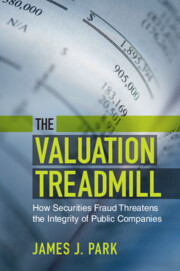Book contents
- The Valuation Treadmill
- The Valuation Treadmill
- Copyright page
- Dedication
- Contents
- Acknowledgments
- 1 Introduction
- 2 Xerox and the Pressure to Meet Projections
- 3 Penn Central and the Decline of Managerialism
- 4 Apple and the Controversy of Projections Litigation
- 5 Enron and Sarbanes–Oxley
- 6 Citigroup and the Financial Crisis of 2008
- 7 General Electric and the Problem of Earnings Management
- 8 The Future of Securities Fraud Regulation
- 9 Conclusion
- Notes
- Index
4 - Apple and the Controversy of Projections Litigation
Published online by Cambridge University Press: 14 July 2022
- The Valuation Treadmill
- The Valuation Treadmill
- Copyright page
- Dedication
- Contents
- Acknowledgments
- 1 Introduction
- 2 Xerox and the Pressure to Meet Projections
- 3 Penn Central and the Decline of Managerialism
- 4 Apple and the Controversy of Projections Litigation
- 5 Enron and Sarbanes–Oxley
- 6 Citigroup and the Financial Crisis of 2008
- 7 General Electric and the Problem of Earnings Management
- 8 The Future of Securities Fraud Regulation
- 9 Conclusion
- Notes
- Index
Summary
This case presents the grimly familiar picture of disappointed investors crying fraud after fortunes were lost when a promising corporation stumbled. US District Court for the District of Massachusetts, 1993 In the Xerox and Penn Central cases, public companies misstated their financial statements to support false narratives of their ability to continue generating profits. Companies also shape investor perceptions of their future performance through disclosures about their businesses, particularly with respect to important products. Just as the conglomerates of the 1970s sought to satisfy market expectations by reporting earnings increases, the computer companies of the 1980s faced pressure to successfully complete the development of new technologies. Investors were willing to pay more for a stock to take into account the possibility that a promising product would be widely embraced by consumers. However, if there was a significant setback, they could lose faith and flee the stock. Computer company stocks were thus more volatile than the stocks of companies in traditional industries.1
Keywords
- Type
- Chapter
- Information
- The Valuation TreadmillHow Securities Fraud Threatens the Integrity of Public Companies, pp. 50 - 71Publisher: Cambridge University PressPrint publication year: 2022

